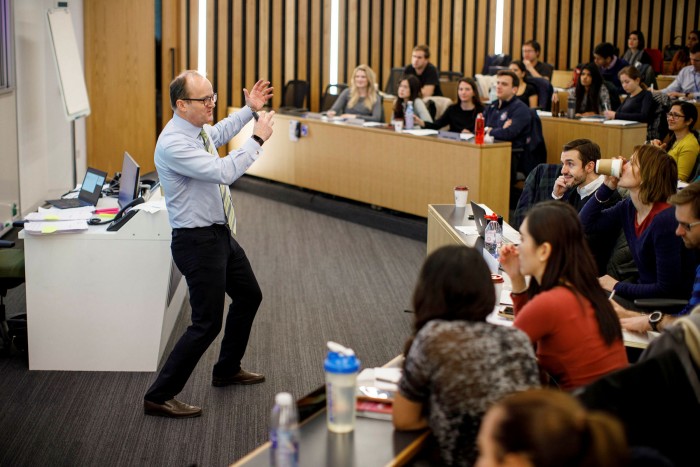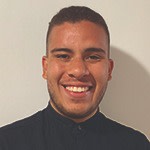What a masters in management did for me
Roula Khalaf, Editor of the FT, selects her favourite stories in this weekly newsletter.
Paula Marjamaa

Finnish. Aalto University. Masters in Global Management (including Cems), graduated 2021. Sustainability intern, Hilti, Austria
What would your advice be to someone who is considering a masters in management?
When you are selecting where to go, really do your research. Take a look at the schools and the programmes they offer. If you can, look at the course specifics, so you can see if there is something that interests you. Some schools specialise in certain areas, so if you know what you want to focus on, then you can research that.
FT Masters in Management ranking 2021 — top 100

Find out which schools are in our ranking of Masters in Management degrees. Learn how the table was compiled and read the rest of our coverage at www.ft.com/mim.
After you have decided where to go, make the most of the experience. Enjoy your time studying and take advantage of all the things the university or the programme has to offer — you can usually get involved in different projects, networking events, and work with companies. It is here you get the knowledge, real-life experience, build your network and meet new people, friends and possibly colleagues.
That is something I really enjoyed and already miss from studying.
Adam Matłacz

Polish. Kozminski University. Masters in Management, graduated 2021. Senior project leader, Demant, Warsaw
Did the course live up to your expectations?
Yes, and to some degree it even exceeded them.
Having done my first degree, I thought there would be one or two subjects I would find really interesting — otherwise it would mostly be repeating things that I already knew, or more theory that I could not put into practice. But actually there were several subjects that were interesting or valid to what I do. One of the courses, on creativity — which was not directly connected to management — was so interesting that I created my own workshop.
I started in IT as a software tester, so I created a workshop for testers called Exploratory Testing Masterclass, which was based on what I learnt at Kozminski and in my professional life. I did the first one for charity, but now I do it commercially. I thought that at the end of the course I would just have a piece of paper to show that I am educated in managerial skills, but I also created something based on my studies.
Dusan Dragicevic

Serbian. Shanghai Jiao Tong University: Antai. Masters in Management (International Business), graduated 2020. Specialist product planning, Porsche China, Shanghai
How do you apply what you learnt on the course?
What has helped me most is that I learnt how to work in a multicultural environment.
I also learnt a lot about doing business in China and its history, culture, the Chinese way of thinking, habits and so on. This is the experience I appreciate the most and use on a daily basis. With my colleagues, Chinese and non-Chinese, I understand how they think much more, thanks to the international nature of the masters. It also supports my work with my Chinese customers: I understand their needs, preferences and tastes much better because I have been studying and living in China.
Having a grasp of both these mindsets helps me be more efficient, productive and proactive in my work. It supports my personal development but it also contributes to my company’s results.
Nikita Lewis

Indian. IIM Calcutta. Post Graduate Programme in Management (MBA), graduated 2021. Senior associate, Boston Consulting Group, Mumbai
What was the most important lesson you learnt on the course?
I learnt to be courageous and ask questions, even when there are no clear answers.
We did an exercise during a course called “Digital Transformation of the World” where we were asked to imagine a magician who knows everything and to consider what we might ask them. We might not receive the answers we need today or tomorrow, but keeping asking is a great start and helps us have an open mindset and avoid inertia.
I have also changed how I view mentoring. Before joining the masters, I believed that reaching out for mentorship and feedback was something you did when you needed help. I was surprised when my professors and seniors proactively guided me, be it during studies, career decisions or interview preparations. I realised that mentorship and feedback go beyond helping when needed and are more about your overall development.
Alejandro De Los Ríos Palacio

Colombian. Neoma Business School. MSc in management, graduates 2022. Sales management trainee, Enterprise Holdings Group, Strasbourg
Why did you decide to study a masters in management?
I chose the course because in my previous work I had seen that so many of my managers did not really know how to manage a team. And since I was a little kid, I really wanted to be a leader.
When I was 14, some friends and I worked in a church in Cali in Colombia supplying breakfasts to people on low incomes — and even then I always had new ideas and wanted to develop.
That is why I chose the masters in management, because I wanted to learn how to motivate a team, how to know if a team is performing, how to develop a team — management is one of my favourite things. Knowing how to figure out how people work and how they interact with each other is something I find really interesting. The masters has given me these skills.
Comments